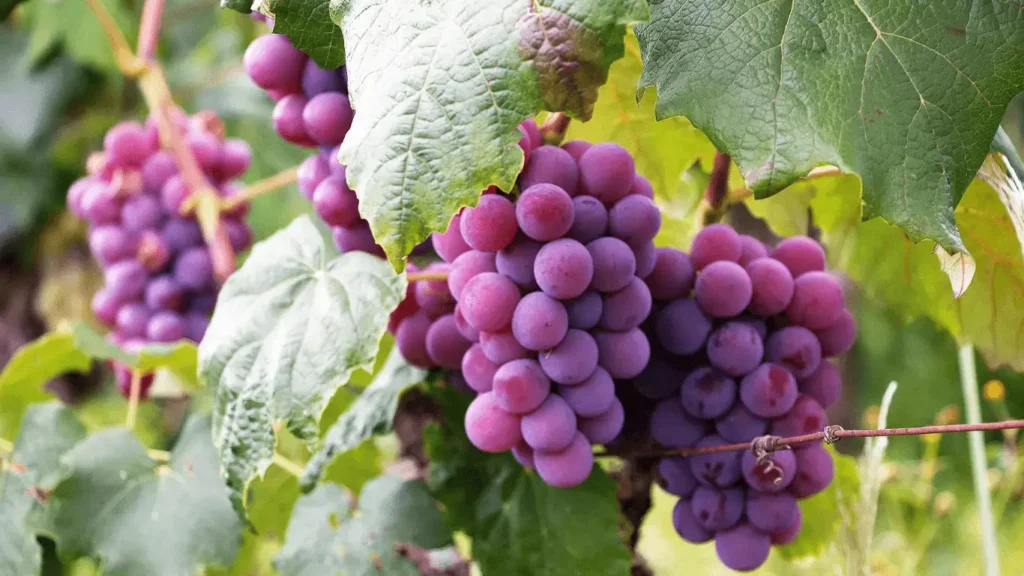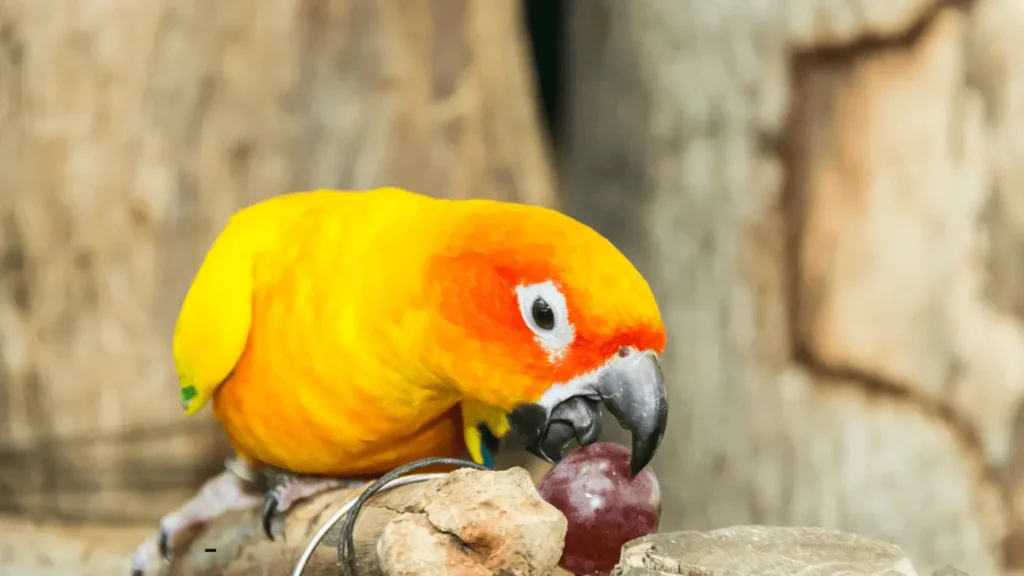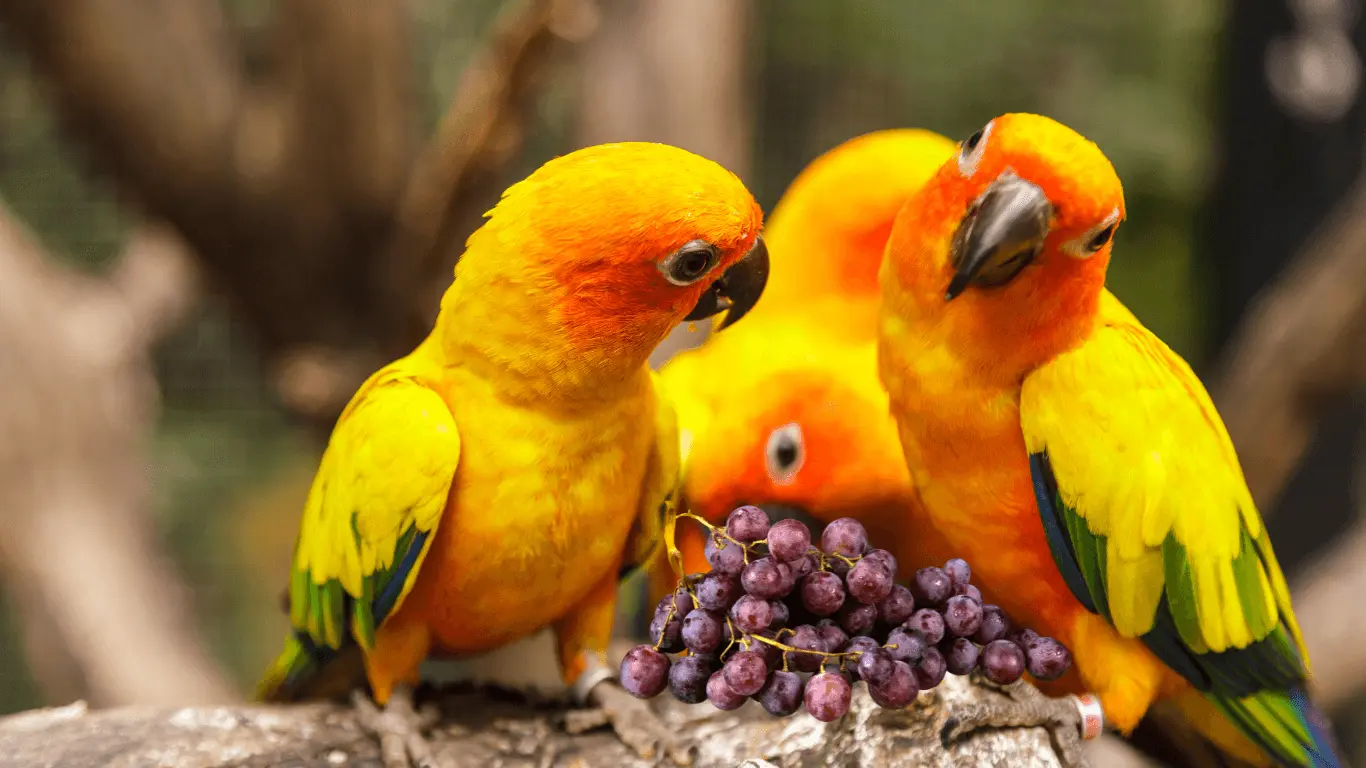Can you safely add grapes to your conure’s diet? Our complete guide breaks down the key information you need to make the best choices for your bird’s nutrition. Learn about the health benefits, potential risks, and best ways to serve grapes. Ensure your conure’s well-being by reading our guide now!”. If you have a conure, you know how delightful and charming these small feathered companions can be.
Understanding Conure Nutrition
Understanding what your conure needs to stay strong and happy is fundamental before we get into the complex structure of grapes. Conures thrive on an eat-less diet that includes seeds, pellets, natural goods, and veggies, just like many other parrots. Natural products are necessary because they provide vital minerals and vitamins.
Understanding Grapes Nutrition

Grapes are more than just a sweet treat. They are brimming with vital nutrients that support your general well-being.
Macronutrients
A serving of grapes (about 1 cup or 151 grams) contains:
- Calories: 104
- Carbohydrates: 27.3 grams
- Protein: 1.1 grams
- Fat: 0.2 grams
- Fiber: 1.4 grams
Micronutrients
Grapes also offer a variety of micronutrients essential for maintaining good health.
Vitamins Found in Grapes
Grapes are a wealthy source of a few vitamins that play vital parts in substantial functions.
Vitamin C
Vitamin C is imperative for resistant bolster, skin well-being, and the assimilation of press from plant-based nourishments. One container of grapes gives around 27% of the prescribed every day admissions of Vitamin C.
Vitamin K
Bone well-being and blood clotting depend on vitamin K. Grapes give approximately 28% of the suggested day-by-day admissions of Vitamin K per cup.
B Vitamins
Grapes contain small sums of B vitamins, counting B1 (thiamine), B2 (riboflavin), and B6, which offer assistance with vitality generation and ruddy blood cell formation.
Minerals in Grapes
Grapes are not fair approximately vitamins; they moreover offer basic minerals.
Potassium
Potassium makes a difference in direct blood weight and liquid adjustment. A container of grapes gives almost 288 mg of potassium, which is 6% of the prescribed everyday intake.
Copper
Copper is basic for shaping ruddy blood cells and keeping up solid bones and nerves. Grapes offer approximately 10% of the suggested day-by-day admissions of copper per cup.
Iron
For the blood to carry oxygen, the press is fundamental. Whereas grapes are not a noteworthy source of press, they do contribute to your everyday intake.
Antioxidants in Grapes
Antioxidants, which are plenteous in grapes, offer assistance to spare your cells from harm.
Resveratrol
Resveratrol, found in grape skins, is known for its heart wellbeing benefits and anti-aging properties. It is a compelling antioxidant that brings down inflammation.
Flavonoids
Flavonoids in grapes, such as quercetin and kaempferol, have anti-inflammatory and antioxidant impacts, supporting general health.
Carotenoids
Carotenoids, such as beta-carotene, contribute to eye well-being and resistant function.
Are Grapes Secure for Conures?
Parrots can securely eat grapes as they are not normally noxious to them. But there are a few things you ought to be mindful of. It’s not great for your parrots to eat as well as numerous grapes. Because of their tall fructose substance, overloading your parrot may be destructive to its well-being. Consider grapes more of a treat for your parrots than a staple nourishment. The measure of the feathered creature decides how numerous grapes to nourish it. Since it is troublesome to decide the correct number, I would fail on the side of caution and offer my proposal. A little parrot, for occasion, ought to not have more than half a grape each time, whereas medium- to large-sized fowls can expend the whole grape. Moreover, I would as it were grant my winged creatures grapes no more than three times per week.
If you provide your parrot as well numerous grapes to eat, it can halt eating other nourishments. This might cause your fowl to become malnourished, which seems to be lethal. Giving less is continuously best to giving more when in question. For direction in deciding the right sum to nourish your fowls, you can also counsel a veterinarian or an avian nutritionist.
Among natural products, grapes have the most elevated concentration of pesticides on their skin and indeed in the mash. Giving grapes ought to be done sparingly and as it were after they have been well cleaned (or indeed their skins evacuated).
Health Benefits of Grapes for Conures

Vitamins and Minerals in Grapes
Grapes are packed with vitamins such as Vitamin C and Vitamin K, along with minerals like potassium and copper. These nutrients can support your conure’s immune system and overall health.
Hydration Benefits
Grapes are around 80% water, making them a fabulous source of hydration, particularly in hot climates. This can offer assistance keep your conure well-hydrated and anticipate dehydration.
Antioxidant Properties
Grapes contain cancer prevention agents like resveratrol, which can offer assistance to combat oxidative push in winged creatures, contributing to superior well-being and longevity.
Risks and Precautions
Sugar Substance and Moderation
While grapes are nutritious, they moreover contain a tall sum of common sugars. Overloading can lead to corpulence and other well-being issues in conures. It’s significant to offer grapes as an intermittent treat or maybe as a staple food.
Pesticide Concerns
Non-organic grapes regularly have pesticide buildups. Continuously wash the grapes completely time recently bolstering them to your conure to evacuate any hurtful chemicals.
Potential Choking Hazards
Grapes can be a choking danger if not arranged accurately. Continuously cut the grapes into little, sensible pieces to avoid choking.
How to Securely Bolster Grapes to Conures
- Choosing the Right Grapes: Opt for natural grapes at whatever point conceivable to minimize introduction to pesticides. Both green and ruddy grapes are fine, but ruddy grapes have somewhat higher antioxidant levels.
- Proper Washing and Preparation: Wash the grapes completely beneath running water. You can moreover drench them in an arrangement of water and prepare pop for a few minutes to guarantee all buildups are removed.
- Serving Measure and Frequency: Limit the number of grapes to 2-3 little pieces a few times a week. This guarantees your conure gets the benefits without exaggerating the sugar intake.
Alternative Natural Products for Conures
If you’re looking to include an assortment to your content’s Eat Less, there are bounty of other natural products to consider. A few secure alternatives include:
- Apples (without seeds)
- Bananas
- Berries (strawberries, blueberries, raspberries)
- Mangoes
- Papayas
These natural products moreover offer distinctive vitamins and minerals, giving a well-rounded wholesome profile.
Why You Ought to Not Bolster Your Parrot Parts of Grapes
It’s awful for your parrots’ wellbeing to nourish them with a parcel of grapes. Overloading grapes can result in:
Gain of Weight
Grapes are amazing for a parrot’s general well-being, but their tall sugar substance may lead to corpulence. A parrot that is overweight is more inclined to sickness. Hence, it’s best to abstain from giving your parrot an over-the-top sum of grapes.
Insufficiency of Vitamins
If you frequently bolster parrots’ grapes, they will promptly overlook other dinners. Vitamin lack, a condition brought on by an imbalanced slim down, might happen from this.
Common Misinterpretations Almost Nourishing Conures
Debunking Myths Around Grapes
Some individuals accept that grapes are destructive to winged creatures due to their sugar substance or pesticide buildups. Whereas these concerns are substantial, appropriate planning and balance can moderate these risks.
General Misinterpretations Around Winged Creature Diets
Another common myth is that feathered creatures can flourish on seeds alone. In reality, eating less exclusively based on seeds can lead to dietary insufficiencies. A blend of pellets, seeds, natural products, and vegetables is significant for their well-being.
Signs of Overloading Grapes
Symptoms to Observe For
If your conure is eating as well as numerous grapes, you might take note of signs like weight pick up, dormancy, or stomach-related issues. Pay consideration to these side effects and alter their eating accordingly.
Long-Term Wellbeing Effects
Consistently overloading sugary natural products like grapes can lead to long-term well-being issues such as weight, diabetes, and liver issues. Adjustment is key to anticipating these conditions.
Creating an Adjusted Eat Less Arrange for Your Conure
Combining natural products, vegetables, seeds, and pellets in your conure’s slim down guarantees they get all essential supplements. Point for a shifted count of calories to keep your winged creature interested and healthy.
Expert Conclusions on Bolstering Grapes to Conures
Veterinarian Insights
Most avian veterinarians concur that grapes can be a solid portion of a conure’s slim down when given in control. They suggest joining an assortment of natural products to anticipate wholesome imbalances.
Avian Nutritionist Recommendations
Avian nutritionists regularly recommend constraining sugary natural products and centering on those with higher fiber substances. In any case, they too recognize that grapes can be useful when advertised appropriately.
Personal Stories from Conure Owners
Many conure proprietors have positive encounters with bolstering grapes to their winged creatures. A few have taken note and made strides in hydration and vitality levels. In any case, control is a common topic among these stories.
Do Grapes Contain Any Toxins?
Toxins are not displayed in grapes. As per the Bloorcourt Veterinary Clinic, no destructive substance has been found in grapes yet. The nearness of poisons has no bearing on the limited nourishing of grapes.
The pesticides, which are habitually displayed in grapes, are as it were cause for concern. A few natural products are considered to be exceedingly “sullied,” counting grapes. Since cancer prevention agents are generally found in the skin of grapes, I continuously bolster my winged creatures’ grapes without the skin, which implies a critical parcel of the cancer prevention agents are misplaced. It is continuously exhorted to bolster grapes in control since there isn’t an ideal answer.
Can Parrots Eat Grape Peels?
Nutritional Substance of Grape Peels
Grape peels contain a critical parcel of the fruit’s cancer-prevention agents and fiber.
Digestibility of Grape Peels
Parrots for the most part have no inconvenience processing grape peels, but it’s imperative to wash them completely to expel any pesticide residues.
Potential Benefits and Risks
While grape peels are nutritious, they can now and then carry pesticides. Washing them well or choosing natural grapes can moderate this risk.
Can Parrots Eat Grape Seeds?
- Composition of Grape Seeds: Grape seeds contain fiber, solid fats, and cancer-prevention agents. In any case, they too have tannins, which can be a concern in huge quantities.
- Digestibility of Grape Seeds: Parrots can process small sums of grape seeds, but as well numerous can cause stomach-related issues. Expelling the seeds sometime recently and bolstering is regularly recommended.
- Potential Benefits and Risks: Grape seeds can give wholesome benefits, but the hazard of stomach-related disturbance implies control is key. If in question, evacuate the seeds.
Are Grapes Hurtful to Infant Parrots?
Grapes are great for newborn child parrots, as fair as they are for grown-up parrots. But, for the same reasons that apply to grown-up parrots, you ought to abstain from giving newborn child parrots an intemperate sum of grapes.
Before feeding them, you must also remove the seeds and peels from the grapes and chop them into smaller pieces. Young parrots could choke on the seeds upon ingestion. Furthermore, their digestive systems might not be able to process grape seeds because they are still developing.
How to Deliver Your Conures Grapes
Parrots do like to eat grapes, as was already said. They discover grapes to be profoundly top-notch and engaging. Giving your parrots an assortment of natural products, counting grapes, will permit you to test this. Without a question, they’ll select grapes over the other assortment of fruits.
There will continuously be winged creatures, even though, they have never eaten new nourishment. My dear pet Loki has never been able to eat anything damp or delicious, indeed veggies and natural products. To draw in these fowls, attempt to show grapes in distinctive ways. You may either squash the grape to serve as a delectable mash or tie it in the cage for them to crunch on. You seem indeed cut the grape into small pieces to include in their meal.
How Numerous Grapes Can My Parrot Have?
As already said, grapes ought to be devoured in balance. You can allow half a grape to a small parrot and an entire grape to a bigger parrot. It is best not to donate grapes day by day. Do not depend fair on grapes as your vitamin source. You can interchange between distinctive natural products each day for variety, counting berries, which are too exceptionally great for parrots. Indeed if your parrot asks for more grapes, keep in mind that they require a well-balanced slim down.
FAQs About Can conures eat grapes
Are grapes better than other fruits for conures?
Grapes are good but should be part of a varied diet.
How often should I feed grapes to my conure?
2-3 small pieces a few times a week.
Can grape seeds be harmful to conures?
Yes, remove the seeds to prevent choking and toxicity.
What should I do if my conure doesn’t like grapes?
Try other fruits like apples or berries.
Are dried grapes (raisins) safe for conures?
Raisins are safe in small amounts but higher in sugar.
Conclusion can conures eat grapes?
So, can conures eat grapes? Completely! Grapes can be a sound and pleasant treat for your conure when encouraged in balance. Keep in mind to wash them all together, cut them into little pieces, and adjust their slim down with other natural products and nutritious nourishments. By doing so, you’ll guarantee your feathered companion remains upbeat, solid, and full of vitality.
Table of Contents

Abubakr is a passionate parrot enthusiast based in Pakistan. He shares his life with his vibrant parrot, Peto, and is dedicated to understanding parrot nutrition, behavior, and training. Through his experiences with Peto, Abubakr aims to gain a deeper insight into the needs and personalities of parrots and to share his knowledge with fellow parrot lovers. With a focus on the nutrition of conures, Abubakr is excited to connect with like-minded individuals and learn from their experiences.
